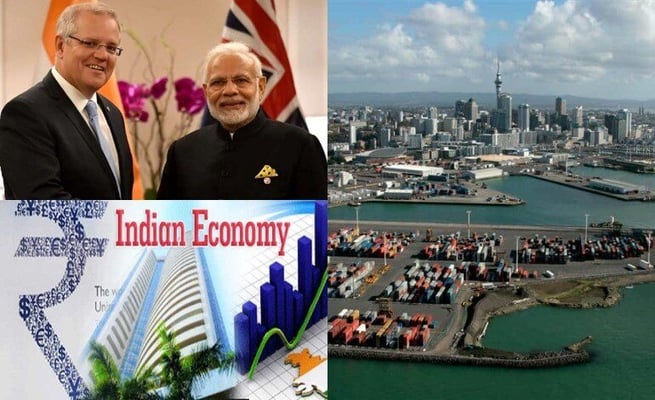Australia redefines India ties as NZ drifts clueless

Australia has marched ahead and signed an India-Australia Economic Cooperation and Trade Agreement (IndAus ECTA), on Saturday, April 2, while New Zealand continues to drift cluelessly about signing a trade deal with India - one of the leading rising economies of the world.
The trade deal was signed by India's Commerce and Industry Minister Piyush Goyal and his Australian counterpart Dan Tehan in the presence of Prime Minister Modi and Australian Prime Minister Scott Morrison in a virtual ceremony that experts believe will give access to 85 per cent of Australian products in the vast Indian market.
Many foreign policy experts may argue that a strategic re-prioritising of New Zealand’s relationship with India may happen in some distant future; however, it is in NZ’s best interests to walk that path sooner rather than later.
There is an undeniable impression that NZ, of the two Trans-Tasman neighbours, has been more closed, or at least less active and enthusiastic in re-opening borders and re-connecting with the rest of the world.
Indeed, such a long-lasting impression about the country’s sluggish approach towards opening and turning up for key potential opportunities available in the global market and platform is not helpful for a country located as remote as NZ.
Given the nature of our remoteness for being located in the wee end of the vast stretch of the Pacific Ocean, ideally, NZ should not have kept our borders and the outlook closed for this long.
Certainly, the government’s outlook towards the rest of the world remains sluggish, with responses emanating only for situations either overly dramatic and grand, such as the Ukraine war, overrunning of the Afghanistan state by the Taliban, or acutely affecting the core national interests like China’s security agreement with Solomon Islands in NZ’s “own backyard” or the signing of Free Trade Agreement with the United Kingdom.
So far, it seems that reinvigorating the relationship or strategically re-prioritising the relationship with India not yet fall into either of the two above mentioned categories of dramatic on one hand and acute national interests on the other hand.
That is why the consistently emanating media coverage from New Delhi and Canberra about the imminent FTA between Australia and India along with several other raft announcements pointing a growing convergence and willingness in enhancing the overall bilateral relations between the two countries, had not incentivised or compelled political leadership in this country to reconsider their priorities with India.
Clearly, the current political leadership of NZ does not see the relationship with India in a light that may deserve any immediate attention and political investment.
Comparably, the news around Australia-India relationship keeps us informed about the many high-level interactions happening in close succession between the two countries, including the two Prime Ministers and senior ministers in the government.
One of the newly identified potential new areas of cooperation, beyond the usual emphasis on enhancement of bilateral trade, economy, and strategic relations between the two countries that is receiving a fresh-relook under the new strategic prioritisation towards India is the area of expanding the mechanism of qualification recognition between the two countries.
Under this proposed area of cooperation, where the two countries are planning to set up a task force that can look into the mechanism for expanding education qualification recognition between Australia and India by the end of 2022, can dramatically enhance the flow and the optimum utilisation of skilled migrants in the economy.
It is to say that a vast chunk of highly skilled migrants like engineers and doctors whose overseas education remains unrecognised in Australia in the absence of appropriate political cooperation and understanding between the two countries and who were forced to languish as cheap workforces such as in supermarkets and driving taxis can potentially get employment in their own field of expertise.
Undoubtedly, this is one of the biggest pain points within diaspora groups living in most western liberal countries with advanced economies that their overseas qualification and work experiences, including in critical health and high-end technology, remains unrecognised, forcing them to live highly resentful lives and waste of their life long accrued skills and talents.
NZ has its own share of burning resentment within this acutely small but highly skilled community of overseas educated doctors and engineers who fail to live a life of dignity purely because their respective educations remain unrecognised in NZ.
This is despite the current global pandemic and the widely acknowledged short supply of critically skilled workforce in NZ’s health sector.
So the key question is that is there any appetite within the current NZ government for re-booting the manner in which we look at the relationship with India.
Indeed, there is an enhanced convergence, particularly outside of government, that the relationship with India needs to be removed from its focus on potential trade dividends and instead be seen from a holistic perspective panning different sectors and government levels, and the government needs to do a catching up.
Other experiences where NZ eventually follows the lead of Australia in responding to global issues and opportunities do suggest that such a possible re-boot of the relationship with India is not unlikely.
However, the need of the hour is today and not later.
There is an already palpable trade diversion happening from NZ to Australia (trade from India), and the current emphasis by Australia to capitalise on its relationship with India will further expedite the speed of diversion of Indian exports to Australia than NZ.
This may not augur well for a country already reeling under the shadow of a short supply of skilled workforce in an economy that is roaring to come out of the global pandemic.
Therefore, it is important that NZ’s political leadership move their gaze beyond the dynamics of dramatic and acute national interest and emphasise important relationships and relationships with India should be considered important.
Australia has marched ahead and signed an India-Australia Economic Cooperation and Trade Agreement (IndAus ECTA), on Saturday, April 2, while New Zealand continues to drift cluelessly about signing a trade deal with India - one of the leading rising economies of the world.
The trade deal was...
Australia has marched ahead and signed an India-Australia Economic Cooperation and Trade Agreement (IndAus ECTA), on Saturday, April 2, while New Zealand continues to drift cluelessly about signing a trade deal with India - one of the leading rising economies of the world.
The trade deal was signed by India's Commerce and Industry Minister Piyush Goyal and his Australian counterpart Dan Tehan in the presence of Prime Minister Modi and Australian Prime Minister Scott Morrison in a virtual ceremony that experts believe will give access to 85 per cent of Australian products in the vast Indian market.
Many foreign policy experts may argue that a strategic re-prioritising of New Zealand’s relationship with India may happen in some distant future; however, it is in NZ’s best interests to walk that path sooner rather than later.
There is an undeniable impression that NZ, of the two Trans-Tasman neighbours, has been more closed, or at least less active and enthusiastic in re-opening borders and re-connecting with the rest of the world.
Indeed, such a long-lasting impression about the country’s sluggish approach towards opening and turning up for key potential opportunities available in the global market and platform is not helpful for a country located as remote as NZ.
Given the nature of our remoteness for being located in the wee end of the vast stretch of the Pacific Ocean, ideally, NZ should not have kept our borders and the outlook closed for this long.
Certainly, the government’s outlook towards the rest of the world remains sluggish, with responses emanating only for situations either overly dramatic and grand, such as the Ukraine war, overrunning of the Afghanistan state by the Taliban, or acutely affecting the core national interests like China’s security agreement with Solomon Islands in NZ’s “own backyard” or the signing of Free Trade Agreement with the United Kingdom.
So far, it seems that reinvigorating the relationship or strategically re-prioritising the relationship with India not yet fall into either of the two above mentioned categories of dramatic on one hand and acute national interests on the other hand.
That is why the consistently emanating media coverage from New Delhi and Canberra about the imminent FTA between Australia and India along with several other raft announcements pointing a growing convergence and willingness in enhancing the overall bilateral relations between the two countries, had not incentivised or compelled political leadership in this country to reconsider their priorities with India.
Clearly, the current political leadership of NZ does not see the relationship with India in a light that may deserve any immediate attention and political investment.
Comparably, the news around Australia-India relationship keeps us informed about the many high-level interactions happening in close succession between the two countries, including the two Prime Ministers and senior ministers in the government.
One of the newly identified potential new areas of cooperation, beyond the usual emphasis on enhancement of bilateral trade, economy, and strategic relations between the two countries that is receiving a fresh-relook under the new strategic prioritisation towards India is the area of expanding the mechanism of qualification recognition between the two countries.
Under this proposed area of cooperation, where the two countries are planning to set up a task force that can look into the mechanism for expanding education qualification recognition between Australia and India by the end of 2022, can dramatically enhance the flow and the optimum utilisation of skilled migrants in the economy.
It is to say that a vast chunk of highly skilled migrants like engineers and doctors whose overseas education remains unrecognised in Australia in the absence of appropriate political cooperation and understanding between the two countries and who were forced to languish as cheap workforces such as in supermarkets and driving taxis can potentially get employment in their own field of expertise.
Undoubtedly, this is one of the biggest pain points within diaspora groups living in most western liberal countries with advanced economies that their overseas qualification and work experiences, including in critical health and high-end technology, remains unrecognised, forcing them to live highly resentful lives and waste of their life long accrued skills and talents.
NZ has its own share of burning resentment within this acutely small but highly skilled community of overseas educated doctors and engineers who fail to live a life of dignity purely because their respective educations remain unrecognised in NZ.
This is despite the current global pandemic and the widely acknowledged short supply of critically skilled workforce in NZ’s health sector.
So the key question is that is there any appetite within the current NZ government for re-booting the manner in which we look at the relationship with India.
Indeed, there is an enhanced convergence, particularly outside of government, that the relationship with India needs to be removed from its focus on potential trade dividends and instead be seen from a holistic perspective panning different sectors and government levels, and the government needs to do a catching up.
Other experiences where NZ eventually follows the lead of Australia in responding to global issues and opportunities do suggest that such a possible re-boot of the relationship with India is not unlikely.
However, the need of the hour is today and not later.
There is an already palpable trade diversion happening from NZ to Australia (trade from India), and the current emphasis by Australia to capitalise on its relationship with India will further expedite the speed of diversion of Indian exports to Australia than NZ.
This may not augur well for a country already reeling under the shadow of a short supply of skilled workforce in an economy that is roaring to come out of the global pandemic.
Therefore, it is important that NZ’s political leadership move their gaze beyond the dynamics of dramatic and acute national interest and emphasise important relationships and relationships with India should be considered important.









Leave a Comment